VR for Business
Updated: February 06, 2024
VR (Virtual Reality) for business is a transformative technology that enables organizations to harness the power of immersive experiences to enhance various aspects of their operations. From employee training and skill development to product prototyping, marketing, and customer engagement, VR offers businesses a versatile toolset to improve efficiency and creativity. Through VR, employees can participate in realistic simulations, allowing them to practice complex tasks, develop problem-solving skills, and reduce training costs. On the customer-facing side, businesses can create immersive marketing experiences that captivate audiences and foster deeper connections with products and services. Moreover, VR facilitates collaboration among remote teams, enabling them to work together seamlessly in shared virtual environments. As the technology continues to evolve and become more accessible, VR for business is poised to revolutionize industries by delivering innovative and engaging experiences that drive productivity, growth, and customer satisfaction.
See also: Top 10 Videoconferencing software
See also: Top 10 Videoconferencing software
2024. Apple brings enterprise device management to the Vision Pro
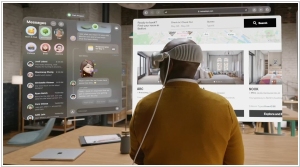
Apple's incorporation of Vision Pro into the Apple Device management process is set to please IT professionals, allowing for the management of these devices akin to how iPhones, iPads, watches, and Macs are currently handled, facilitating seamless activation during onboarding or device replacement. Previously, augmented reality and virtual reality enterprise applications have been explored, particularly in manufacturing, design, and field service sectors. However, Apple identifies the potential for guided real-time work scenarios, such as training or task execution, as a significant use case for Vision Pro. Furthermore, the provision of an unlimited desktop with access to standard work applications could prove advantageous for knowledge workers. The company is also equipping IT professionals with familiar tools found on other Apple devices, including single sign-on, identity management, and security features.
2024. Zoom debuts its app for Vision Pro, featuring digital personas, 3D files and more
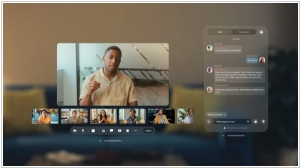
Zoom has unveiled its visionOS app designed specifically for Apple's Vision Pro. This innovative application introduces various features including "persona" support, enabling users to utilize a digital avatar during calls, and 3D object sharing through the "Team Chat" feature, among others. Apple's Persona feature captures a user's face scan, providing a spatial representation of themselves within Vision Pro, and Zoom's dedicated app seamlessly incorporates this, allowing participants to observe facial and hand movements during meetings. Additionally, Zoom on Vision Pro leverages the headset's augmented reality (AR) technology, presenting video calls as floating windows that blend seamlessly with the user's physical space. The visionOS apps' three-dimensional interface facilitates the sharing of 3D files, bringing objects to life in the user's environment. While 3D object sharing will not be available at the initial launch, Zoom has announced plans to roll out this feature later in the spring.
2023. Transfr, a VR platform for workforce training, raises $40M
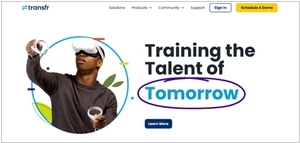
Transfr, a startup specializing in VR tools for training and career advancement, has successfully secured $40 million in funding during its Series C round. Their innovative approach combines virtual reality simulations with hands-on training, offering realistic learning experiences to individuals in sectors like manufacturing. Through a digital coach, users are guided through tasks, receiving tailored instructions, actionable feedback, and performance evaluations. Transfr focuses on "middle skills" jobs, which require more training than a high school diploma but less than a four-year college degree. Despite these jobs constituting nearly half of the U.S. labor market, only about 40% of the workforce is currently adequately trained for middle-skill roles.
2022. Meta partners with Microsoft to bring VR to Teams
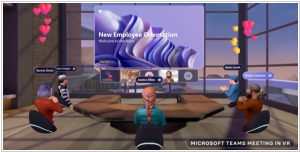
Meta has recently announced a strategic partnership with Microsoft, aimed at incorporating Windows apps and integrating Microsoft Teams functionalities into Meta's metaverse hardware endeavors. This collaboration entails the integration of Microsoft Teams with Quest devices, enabling seamless communication and collaboration. Furthermore, Microsoft will provide a solution to stream Windows apps directly to Meta's headsets. The partnership also paves the way for the inclusion of custom 3D avatars in the metaverse experience. In terms of collaboration, Meta's VR space for teamwork, Horizon Workrooms, will be connected with Teams, allowing users to join Teams meetings directly from Workrooms. Additionally, Microsoft 365 will be accessible on Quest, enabling users to interact with content from productivity applications such as Word, Excel, PowerPoint, and Outlook. Notably, these are not full-fledged VR versions of the apps but rather Progressive Web Apps designed for the purpose.
2021. Training platform Virti raises $10M to teach soft skills in VR
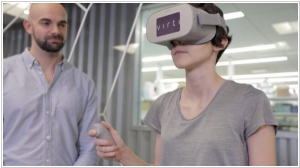
Digital training platform Virti has successfully raised $10 million in a Series A funding round. Virti offers a versatile training experience that can be accessed through various devices, including mobile and desktop devices, as well as VR/AR headsets. By utilizing data captured across these platforms, Virti analyzes, measures, and provides feedback on employee performance, transforming subjective skill assessments into objective and measurable data. The company asserts that its deep learning technology has significantly enhanced training outcomes, boasting improvements of up to 230%, while also achieving a remarkable 978% increase in revenues. Moreover, Virti provides a cloud-based simulation creation suite that requires no coding, enabling organizations to develop customized training modules tailored to their specific needs.
2021. SightCall raises $42M for its AR-based visual assistance platform
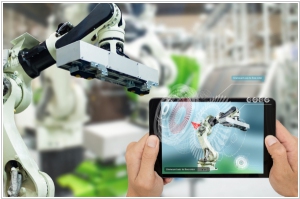
SightCall, an innovative startup, has secured a notable $42 million in funding for its augmented reality platform designed to enhance the productivity of field service teams, the organizations they represent, and their customers during technical and mechanical maintenance or repair operations. At the heart of SightCall's offering lies its advanced AR technology, seamlessly integrated into their own applications or the service apps utilized by their clients. The platform also integrates with commonly used customer service software such as Microsoft, SAP, Salesforce, and ServiceNow. By leveraging augmented reality, SightCall enhances the service experience by overlaying additional information, pointers, and other helpful tools onto the live video stream, thereby facilitating more efficient and effective problem-solving.
2020. HTC offers businesses virtual reality meetings
With the ongoing coronavirus lockdowns forcing millions of individuals to participate in online meetings from the comfort of their homes, HTC has introduced a solution that takes these meetings to the next level—virtual reality. HTC recently unveiled its Vive Sync platform, designed specifically for business meetings conducted in virtual reality, and it is now available for free until the end of 2020. Users familiar with VR applications will find the experience of using Vive Sync to be intuitive. To begin, users create their own Vive Sync avatar, starting with a selfie and then customizing it to their liking. The virtual meetings hosted on Vive Sync seamlessly integrate with popular business tools like OneDrive, enabling participants to share a variety of content such as PDFs, videos, and 3D models within the virtual meeting space. Currently, Vive Sync supports up to 30 participants per session. It is worth noting that all participants will require Vive headsets, which are priced between $549 and $1,000+. Employers, you now know what to do!
2018. Microsoft Visio integrates with Hololense
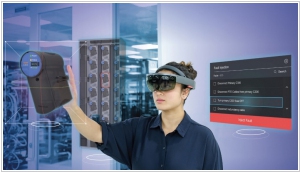
Microsoft is positioning its AR headset, HoloLens, as a tool to enhance productivity, improve quality, and ensure safety by enabling companies to reimagine their processes, data, and workforce, ultimately driving business impact and customer value. One area of focus for Microsoft is updating its Visio software, which now includes features tailored to intelligent manufacturing scenarios, such as facility layout optimization. To demonstrate the potential of intelligent manufacturing, Microsoft will collaborate with its customer, Dürr AG, and incorporate the expertise of Visio partners, including FaciWare GmbH for facility management solutions and X-Visual Technologies GmbH for PnID (Piping and Instrumentation Diagram) solutions.


